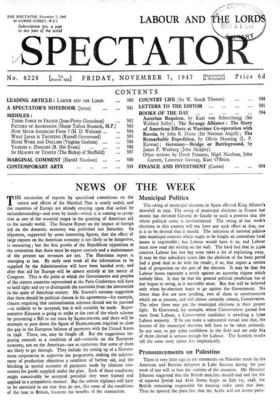Municipal Politics
The swing of municipal elections in Spain effected King Alfonso's downfall in 1931. The swing of municipal elections in France last month has elevated General de Gaulle to such a position that the whole political scene is revolutionised. The swing of last week's elections in this country will not have any such effect as that, nor is it to be desired that it should. The intrusion of national politics into municipal contests which ought to be fought on immediate local issues is regrettable ; but Labour would have it so, and Labour must now read the writing on the wall. The hard fact that in 3,300 contests Labour has lost 695 seats takes a lot of explaining away. It may be that subsidiary issues like the abolition of the basic petrol had a good deal to do with the result ; if so, that argues a certain lack of proportion on the part of the electors. It may be that the Labour losses represeht a revolt against an austerity regime which nobody likes. It may be that the general political pendulum has at last begun to swing, as it inevitably must. But that will be believed only when by-elections begin to go against the Government. No fewer than five are now pending, two of them in constituencies which are at present, and will almost certainly remain, Conservative. The other three may put the municipal elections in their proper light. In Gravesend, for example, where Conservatives gained five seats from Labour, a Conservative candidate is attacking a 7,000 Labour majority. If he can make a substantial inroad into that, the lessons of the municipal elections will have to be taken seriously. In any case, to put 2,600 candidates in the field and see only 824 of them elected is serious enough for Labour. The Scottish results tell the same story rather less emphatically.


































